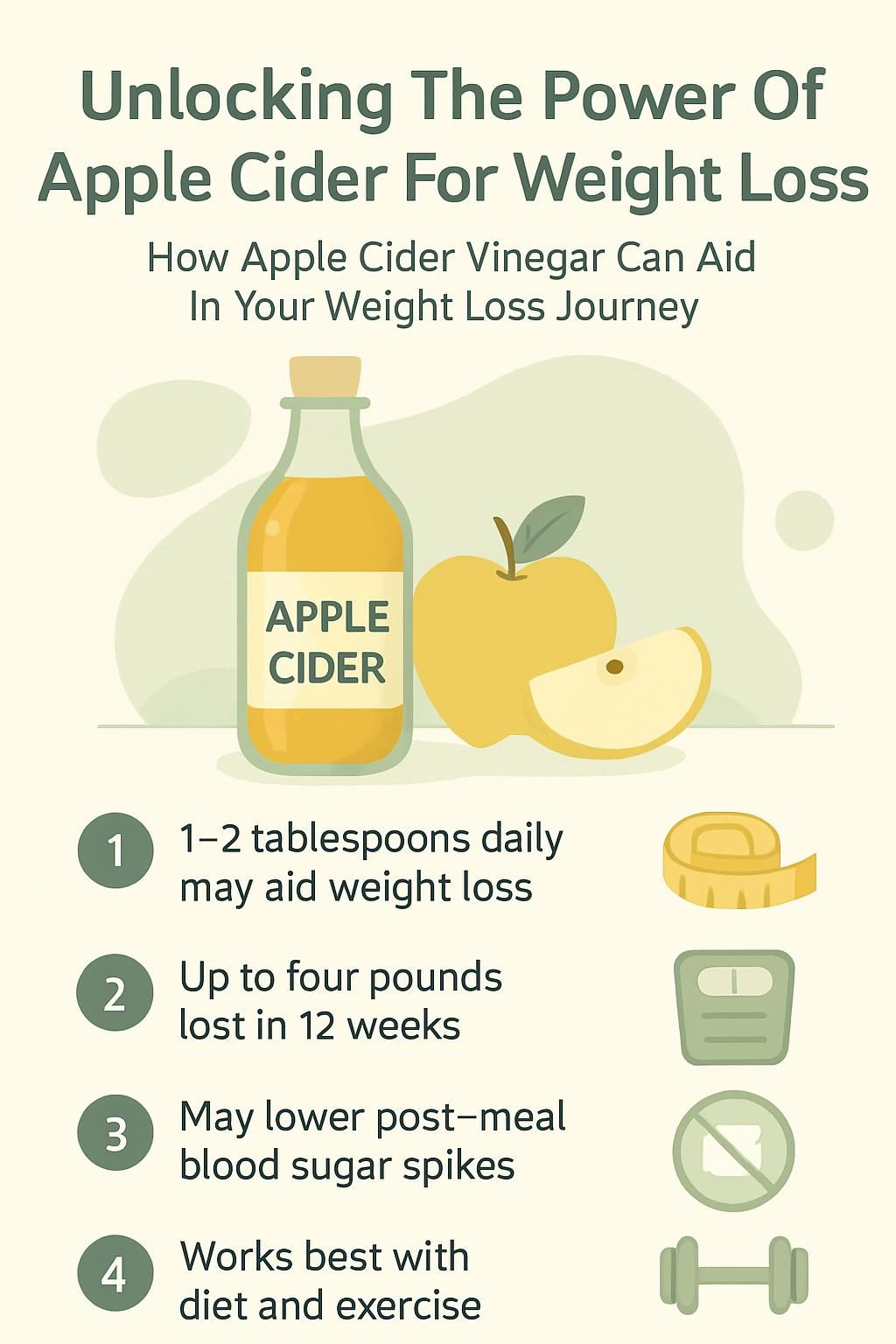Unlocking The Power Of Apple Cider For Weight Loss: How Apple Cider Vinegar Can Aid In Your Weight Loss Journey
Our Nutrition Assistant AI Suite will transform your body. You will lose fat, get toned, and build muscle. Gain confidence and optimal health.
If you struggle to manage your weight and want a simple, natural helper, you are not alone. Apple cider vinegar has gained attention because some studies suggest it may support weight management.
In this post, you will learn how apple cider vinegar works, how much to use safely, and easy ways to add it to meals. Use these steps to start your path toward better health today.
Key Takeaways
- In a 2009 randomized trial, adults who took 1 to 2 tablespoons of vinegar daily for 12 weeks lost up to four pounds and lowered triglycerides.
- Taking apple cider vinegar before high carb meals may blunt post-meal blood sugar and insulin spikes, based on a placebo-controlled study and dietitian guidance.
- Common guidance is 1 to 2 tablespoons, 15 to 30 mL, diluted daily before meals to help appetite control and steady weight loss.
- Possible side effects include enamel wear, stomach upset, and interactions with insulin or diuretics. Talk with your doctor if you take medication.
- Apple cider vinegar works best with exercise and balanced meals. Research does not support it as a quick fat burner or stand-alone solution.

Understanding Apple Cider Vinegar and Its Composition

Apple cider vinegar starts as fermented apple juice. Fermentation creates acetic acid, which gives vinegar its sour taste and possible health benefits for weight loss.
What is the fermentation process behind apple cider vinegar?
First, fresh apples are crushed to release juice. Yeast is added to convert natural sugars in the juice into alcohol, creating hard cider.
Next, helpful bacteria called Acetobacter turn the alcohol into acetic acid, a process known as acetic acid fermentation. Most bottles contain 5 to 6 percent acetic acid, which is the main active ingredient.
This two-stage process also produces small amounts of enzymes, probiotics, and minerals. Raw and unfiltered types often include the “mother,” a cloudy mix of proteins and friendly bacteria.
These parts may support gut health and metabolism. You get a naturally fermented food that can fit into a healthy diet focused on weight management.
What nutrients are found in apple cider vinegar?
One tablespoon has about 3 calories and almost no carbs, protein, or fat. Potassium is present, but in small amounts compared to foods like bananas.
Fermentation forms organic acids, such as acetic acid, along with small amounts of amino acids and antioxidants. These likely explain most of the health effects linked to apple cider vinegar.
Acid levels can vary among brands. While it is not a vitamin powerhouse, vinegar delivers a unique mix of acids and trace nutrients that may influence appetite and blood sugar control.
Weight Loss Benefits of Apple Cider Vinegar
Think of apple cider vinegar as a helper, not a hero, in a smart weight plan.
How does apple cider vinegar help reduce appetite and increase fullness?
Using cider vinegar for weight loss may help you feel less hungry and more satisfied after meals. A 2022 review of seven studies found that four of six short-term trials reported lower appetite when vinegar included at least 24.6 mmol per liter of acetic acid.
Some researchers also observed lower daily calorie intake with one or two tablespoons per day. One small study suggested that some fullness might come from mild nausea, not true satiety signals.
Adding vinegar may help you trim portions when combined with healthy eating habits. Evidence is mixed, so consider ACV one tool among many rather than a single fix.
Can apple cider vinegar help stabilize blood sugar levels?
Apple cider vinegar may steady blood sugar after carb-heavy meals. In a placebo-controlled study, one to two tablespoons taken before or with the meal lowered both glucose and insulin levels.
Acetic acid slows the breakdown of starch into sugar in your gut. This can reduce glucose spikes and improve insulin sensitivity, including in people with type 2 diabetes.
Some small studies report better fasting glucose and A1C after 12 weeks of use. Researchers at Beth Israel Deaconess Medical Center have noted lower post-meal spikes, likely due to slower absorption.
I saw my home glucose readings drop by about twenty points on days I drank diluted ACV before dinner.
“One to two tablespoons of ACV in water with meals can noticeably impact post-meal glucose,” said a registered dietitian at BMJ.
This glucose effect leads many people to ask about a possible boost to metabolism or fat burning.
Does apple cider vinegar boost metabolism and fat burning?
Animal studies show acetic acid can limit fat buildup and raise fat burning in rodents. For example, rats fed acetic acid gained less fat than rats that did not receive it.
Human trials have not confirmed a direct metabolism boost or faster fat loss. The way vinegar affects fat tissue in people may differ from animals.
If your goal is fat loss, pair ACV with a balanced diet and regular exercise. That combination gives you the best shot at steady progress.
How does apple cider vinegar affect gastric emptying?
Apple cider vinegar can slow the movement of food from the stomach to the small intestine, a process called gastric emptying. Slower emptying can help you feel full longer and may reduce calorie intake.
This effect is not helpful for everyone. People with type 1 diabetes or gastroparesis may feel worse with added vinegar. Evidence is limited and sometimes biased, so talk with your doctor if you have ongoing digestive or glucose problems.
Research on Apple Cider Vinegar for Weight Loss
Research points to modest benefits, especially with a calorie deficit and daily activity.
What are the main research findings on apple cider vinegar and weight loss?
Studies suggest ACV can support weight loss when added to a restricted calorie diet. In a 2009 study of 175 adults, people drank 0, 1, or 2 tablespoons daily.
After three months, the vinegar groups lost two to four pounds and had lower triglycerides than the no-vinegar group. A 2018 study of 39 adults also found that 30 mL daily for twelve weeks led to greater drops in body weight and body fat percentage.
That group also reduced belly fat and triglycerides more than the control group. Most trials are small and short, but they show ACV can add a small edge when paired with healthy habits.
For me, one tablespoon in water before meals helped me feel full sooner and cut cravings, and my body mass index trended down over several months.
What challenges exist in studying apple cider vinegar’s effects on weight loss?
Many studies use small samples or weak designs. One 2018 trial did not include a control or placebo group, which makes it hard to credit vinegar alone, rather than diet or exercise changes.
There is no clear guidance on the best dose, timing, or long-term effects. The exact way vinegar influences human body weight over time is still unclear.
In my own tracking, two tablespoons a day in water produced only mild appetite changes, and real waist changes came only after I added regular exercise and a calorie deficit. These gaps make doctors and consumers cautious about bold claims.
Health Perks of Apple Cider Vinegar
Small daily habits add up, and ACV may support several areas of health.
How does apple cider vinegar support digestive health?
ACV’s acidity may raise stomach acid levels, which can help break down food and absorb nutrients. Some people also find it acts like a mild diuretic, helping the body release extra water.
Lab studies show vinegar can limit harmful microbes, which may support a healthier gut environment. Many people use 1 to 2 tablespoons diluted in water before meals to aid digestion.
When I used a tablespoon in a salad dressing, I felt less bloated after meals. Vinegar can also slow stomach emptying, which helps you feel full longer.
Researchers continue to explore how these digestive effects might support weight control.
What are the cardiovascular benefits of apple cider vinegar?
Better digestion supports overall wellness, and it may also benefit your heart. A 2021 review of nine clinical trials found that ACV use was linked with lower cholesterol and triglycerides.
In the 2009 study, participants who took ACV for three months had lower triglycerides than those who did not. You may see a small improvement in your lipid profile when ACV is added to a calorie deficit.
I began taking a teaspoon in water before lunch, and my next checkup showed improved cholesterol numbers. ACV can be one part of a heart-smart routine that includes diet, movement, and sleep.
Can apple cider vinegar help control blood pressure?
Some people say ACV helps lower high blood pressure, but direct evidence is limited. Research has not shown a clear, consistent drop in blood pressure from ACV alone.
ACV can interact with diuretics and some blood pressure drugs by affecting potassium levels. Since nerves and muscles need potassium to work well, changes here may matter. Talk with your healthcare provider before adding ACV if you take heart or blood pressure medicine.
Using Apple Cider Vinegar for Weight Loss
The right dose and timing matter, and safe dilution protects your teeth and throat.
What is the recommended dosage of apple cider vinegar for weight loss?
Most experts suggest 1 to 2 tablespoons, 15 to 30 mL, per day. Split the dose into 2 or 3 servings and take it before meals.
Start with 1 teaspoon daily to see how your body reacts. This approach has been used safely for up to 12 weeks in studies.
Always dilute ACV to protect tooth enamel. Avoid more than 2 tablespoons per day to limit nausea, throat irritation, or enamel damage.
When is the best time to consume apple cider vinegar for weight loss?
Take ACV 15 to 30 minutes before meals. Dilute 1 to 2 tablespoons in a large glass of water. This may curb appetite and promote fullness.
This timing may also help control post-meal blood sugar, which supports weight goals. Studies show that pre-meal vinegar with carbs can lower glucose spikes.
In my routine, a diluted dose before lunch helped me feel satisfied and reduced afternoon snacking. Always dilute, since the high acidity can harm tooth enamel if taken straight.
How should apple cider vinegar be safely diluted for consumption?
ACV must be diluted to avoid burns and irritation. Follow these steps for safety and comfort.
- Mix 1 to 2 tablespoons of ACV with at least 8 ounces, 240 mL, of water to reduce irritation.
- Stir well so the vinegar spreads evenly; undiluted ACV can burn mouth and throat.
- Sip through a straw to limit contact with teeth and enamel.
- Take with meals or food to reduce side effects compared with an empty stomach.
- Do not exceed 2 tablespoons per day to avoid nausea or indigestion.
- Avoid ACV tablets, which may stick in the throat and cause burns.
- Rinse your mouth with water after drinking ACV and wait 30 minutes before brushing to protect enamel.
Tasty Apple Cider Vinegar Recipes
Small flavor upgrades make healthy habits easier to keep.
How do you make a simple apple cider vinegar and water drink?
This quick drink supports your plan and may steady glucose after meals.
- Measure 1 to 2 tablespoons, 15 to 30 mL, of apple cider vinegar.
- Pour the vinegar into a large glass.
- Add at least 8 ounces, about 240 mL, of water for safe dilution.
- Stir until fully mixed.
- Drink before a meal to support fullness and appetite control.
- Use a straw to limit acid contact with teeth.
- Do not exceed two tablespoons per serving.
- Never drink ACV straight, since strong acid can burn tissue.
- Add a squeeze of lemon or a teaspoon of honey for taste if needed.
- Refrigerate leftovers in a covered container and drink within 24 hours.
This simple method shows how vinegar has been used in everyday wellness routines.
What is a good recipe for apple cider vinegar detox tea?
Apple cider vinegar tea is easy to make and fits a balanced diet.
- Use 1 to 2 tablespoons of ACV with the “mother” for more natural compounds.
- Pour 1 cup of hot, not boiling, water into a mug.
- Add juice from half a lemon for vitamin C and flavor.
- Stir in 1 teaspoon of raw honey for gentle sweetness.
- Add a pinch of cinnamon or fresh ginger for extra taste.
- Let it cool to a drinkable temperature to protect enamel.
- Sip before meals to support fullness and reduce intake.
- Limit to twice per day to avoid stomach upset or drug interactions.
- Always dilute ACV in water or tea to protect teeth and throat.
- Store ACV in a cool, dark place to maintain quality.
How can apple cider vinegar be used in salad dressings?
ACV pairs well with olive oil for a tangy, heart-friendly dressing.
- Combine 2 tablespoons ACV with 3 tablespoons extra virgin olive oil for a basic vinaigrette.
- Add salt, black pepper, and dried herbs to deepen flavor.
- Whisk in 1 teaspoon Dijon mustard to help the oil and vinegar blend.
- Use a small amount of honey or agave if you prefer a softer taste.
- Toss with leafy greens and bright vegetables for a fresh, filling salad.
- Shake before serving since separation happens quickly.
- Keep dressing to about two tablespoons per serving to manage calories.
- I use ACV and olive oil on mixed greens at lunch, which helps me feel satisfied and steady my afternoon energy.
Considerations and Side Effects
A little planning keeps ACV helpful and safe for daily use. This content is educational, not medical advice.
How does apple cider vinegar affect dental enamel?
Apple cider vinegar is acidic, and acid can erode enamel. Frequent acid exposure lowers mouth pH and softens the tooth surface, which raises the risk for sensitivity and cavities.
Always dilute ACV and use a straw when possible. I noticed more tooth sensitivity when I took straight shots of vinegar. Switching to diluted servings stopped the discomfort.
What digestive side effects can apple cider vinegar cause?
Larger amounts can upset your stomach. You may feel nausea or burning after a strong dose.
People who took more than 30 mL daily reported more indigestion and reflux in some studies. If you have gastroparesis, especially with type 1 diabetes, vinegar can slow your stomach even more. That can worsen symptoms and make blood sugar harder to control.
I once used undiluted ACV in a dressing and felt waves of nausea for hours. Dilution or mixing with food helps prevent discomfort.
Are there any concerns about apple cider vinegar interacting with medications?
ACV can interact with certain drugs, including diuretics and insulin. These combinations may lower potassium levels.
Potassium supports nerve and muscle function. If you use potassium-lowering diuretics, high vinegar intake may increase the risk for low potassium. People with diabetes should be careful because ACV may affect insulin needs.
I took ACV with my daily medication and later felt muscle weakness. My doctor found low potassium. Always check with your healthcare provider before using ACV with medicines.
Key Data Table
| Medication Type | Potential ACV Interaction | Possible Health Risk |
|---|---|---|
| Diuretics | Increased potassium loss | Muscle weakness, cramping |
| Insulin | Changes in insulin effectiveness | Blood sugar swings |
| Potassium-lowering drugs | Higher risk of low potassium | Nerve, heart, and muscle issues |
Guidelines for Apple Cider Vinegar Integration
With a few smart choices, ACV can fit your routine and goals.
How do you choose quality apple cider vinegar?
Pick a brand that lists acetic acid percentage on the label. Acetic acid is the key active compound for appetite and blood sugar effects.
Choose unfiltered and unpasteurized options with the “mother.” Glass bottles protect quality better than some plastics.
In my testing, unfiltered cans had richer flavor and seemed more effective in dressings. Store ACV in a cool, dark space for freshness, and stick with products that list clear ingredients.
How can you monitor your health when using apple cider vinegar?
Track stomach changes, such as nausea or reflux, and note bowel habit changes. Watch for tooth sensitivity or yellowing, which can signal enamel wear. Regular dental visits help catch problems early.
Check with your doctor before starting ACV if you take medications or have health conditions. Ask about interactions, especially if you use drugs for diabetes, blood pressure, or tuberculosis.
I felt mild stomach discomfort during my first week, which improved after I increased dilution. Keep a short journal to log energy, digestion, and any symptoms so you can share clear details at appointments.
How do you maintain dietary balance while using apple cider vinegar?
Pair ACV with a balanced plan of fruits, vegetables, lean protein, and whole grains. Limit highly processed foods and alcohol to support steady progress.
Healthy nutrition and physical activity drive real weight loss. Apple cider vinegar cannot replace these basics.
Follow simple plate guidance. Fill half your plate with produce, one quarter with protein such as chicken or beans, and one quarter with whole grains. Stay hydrated. If ACV bothers your stomach, reduce the amount or use it less often.
Frequently Asked Questions
Here are clear answers to common questions about ACV and weight management.
What is the recommended daily intake of apple cider vinegar?
Most people do well with 1 to 2 tablespoons, 15 to 30 mL, per day. Always dilute in a large glass of water and take before meals to support appetite control.
Start with 1 tablespoon and increase if you feel fine. I sip a diluted tablespoon before lunch and dinner, which helps me watch my portions. Taking more than 2 tablespoons does not add benefits and increases the risk of side effects.
Does apple cider vinegar specifically target abdominal fat?
Research does not show that ACV targets belly fat directly. In one 2018 study, ACV users lost more belly fat than non-users, but the sample was small and other habits likely helped.
You may notice a slight change at your waist if you combine ACV with diet and exercise. I felt less bloated and had more steady energy, but spot reduction did not occur.
What are the differences between apple cider vinegar tablets and liquid?
Tablets are convenient, but they can stick in the throat and may cause burns. Liquid ACV absorbs quickly but must be diluted to protect your mouth and esophagus.
Labels vary in acetic acid content. Some tablets contain less active acid than liquid versions. If you use the liquid for weight loss, dilute 1 to 2 tablespoons in at least 8 ounces of water.
Pick the form you can use safely and consistently. Dilution, dosing, and habits matter more than form.
Lifestyle Factors in Weight Loss Success
Pair ACV with habits that move the needle.
How do physical activity and nutrition contribute to weight loss?
Movement helps you burn more calories. The National Heart, Lung, and Blood Institute notes that a calorie deficit leads to weight loss.
A balanced diet with vegetables, fruits, lean protein, and whole grains helps you feel full on fewer calories. Swapping sugary drinks for water, or fried food for grilled, can save hundreds of calories a day.
Exercise builds muscle, which raises metabolism so you burn more energy at rest. I added brisk walks and noticed my clothes fit better within weeks.
Start slowly and check with a provider if you have health concerns. Combining these basics with ACV may improve results for many people.
How can apple cider vinegar be combined with healthy lifestyle habits?
Use ACV with the core habits that work. Mix 1 to 2 tablespoons into dressings or drink it diluted before meals.
Pair ACV with a calorie deficit for better results. Studies suggest vinegar may support fullness and help reduce intake.
Track portions, stay active, and build meals with lean protein, whole grains, fruits, and vegetables. I added ACV while walking 30 minutes daily. After three months, I noticed better digestion and fewer snack cravings.
Conclusion
Apple cider vinegar can support your weight loss plan. It may help curb appetite and smooth post-meal blood sugar. Research points to small but meaningful benefits, especially over 12 weeks, and best results appear with exercise and balanced meals.
Use it safely, dilute every dose, and start small. If you take medicines or have a medical condition, talk with a healthcare professional. Thoughtful use helps you get the most from apple cider vinegar while protecting your health.
FAQs
1. How does apple cider vinegar support weight loss?
Apple cider vinegar may help with weight loss by increasing feelings of fullness, which can lead to eating fewer calories. Some studies suggest it may also help regulate blood sugar and improve metabolism. For example, a 12-week study found that people who consumed one tablespoon of apple cider vinegar daily lost more weight than those who did not (Kondo et al., 2009).
2. What is the recommended amount of apple cider vinegar for weight loss?
Most research suggests one to two tablespoons of apple cider vinegar mixed with water per day is safe for most adults. Drinking it before meals may enhance its effects. Always dilute it to protect your teeth and stomach lining.
3. Are there any risks or side effects of using apple cider vinegar for weight loss?
Apple cider vinegar is acidic. Taking it undiluted may damage tooth enamel or irritate your throat. Some people may experience stomach upset. It may also interact with certain medicines, such as insulin or diuretics. Consult a healthcare provider before starting.
4. Can apple cider vinegar replace healthy diet and exercise for weight loss?
Apple cider vinegar should not replace a balanced diet or regular physical activity. It may support your efforts but works best when combined with healthy eating and exercise habits. My own experience showed better results when I paired it with a nutritious meal plan and consistent activity.
Summary:
Apple cider vinegar may aid in weight loss by promoting fullness and supporting blood sugar control. Safe use involves dilution and moderation. It should be part of a broader approach that includes healthy food choices and physical activity. Always check with a healthcare professional before adding it to your routine.







